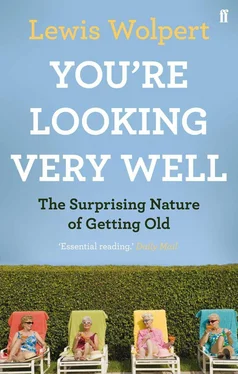Cells can respond to new situations by increasing their growth in ways that do not necessarily lead to cancer, but have other effects. The prostate in older men is all too good an example. This is due to increased proliferation of the epithelial cells and fibroblasts, and an increase in size of the smooth muscle. This results in increased urination as the prostate protrudes into the bladder. Why this should occur with age is just not known, and it all too often can develop into a tumour. But not all abnormal increases in growth are cancerous, thankfully.
Decline of the immune system with age is serious. In the elderly, many alterations of both innate and acquired immunity have been described. This process is responsible for increased susceptibility to infectious diseases such as flu and pneumonia, as well as being at the root of the biological mechanisms responsible for inflammatory age-related diseases. In the USA 90 per cent of deaths from flu and pneumonia are in people aged over 65 years.
Osteoarthritis is a type of arthritis and some 8 million people in the UK suffer from it. It affects mainly older people starting at around age 45, and is caused by the breakdown and eventual loss of the cartilage that serves as a cushion between the bones of the joints. Loss of the cartilage cushion causes friction between the bones, leading to pain and limitation of joint mobility. People with osteoarthritis usually have joint pain and limited movement. Unlike some other forms of arthritis (there are over a hundred types), osteoarthritis affects only joints and not internal organs. More than half of the population aged 65 or older would show X-ray evidence of osteoarthritis in at least one joint. Both men and women have the disease. It is due to a combination of factors, including being overweight, the ageing process, joint injury, and stresses on the joints from certain jobs and sports activities.
Osteoporosis is a silent disease in which bones become extremely fragile. The bone mineral density is reduced, and bone structure is disrupted. If left untreated, it can progress painlessly until a bone breaks, typically in the hip, spine or wrist, and these breaks are extremely painful and can take a long time to heal. It is claimed that one in every two women and one in every four men over 50 will break a bone due to osteoporosis. Gout, however is not age-related.
Falls are amongst the most common and serious problems facing the elderly. They can lead to death, reduced function and admission to a nursing home. About half of the over-65s have a fall each year and the numbers increase with age. Cognitive impairment and dementia increase the risk of falls and the risk of fractures to bones is greater. Balance problems and dizziness are considerably more common the older the person—three out of five women aged 80 and over experienced one or both of these at least sometimes, compared with only one out of five women in their 50s. Repeated falls can lead to the need for long-term care. Difficulties with walking and climbing stairs are all too common amongst those over 75. More than 2,300 older people fall every day and 80,000 of those who have fallen during the year are afraid to leave their homes. Exercise programmes can help in preventing falls.
Older people have an abnormal gait when walking, and this is evident in about one third of those over 65. The characteristics include slow speed, short step length and large variability, narrow stride width, and stepping frequency. Uneven pavements—in London one in five pavements is in a poor state of repair—can be hazardous. Elderly people could one day be relying on a bodysuit, rather than a Zimmer frame, for support. Scientists in Japan are developing the ‘Michelin gran’ Lycra suit which is covered in pairs of inflatable ‘muscles’ which assist the wearer’s real muscles. When they inflate, they help the wearer move their limbs with more strength and stability.
Type 2 diabetes is most often seen in older adults, with half of all cases diagnosed in people of 55 and over. It is by far the most common form of diabetes, and occurs when the body produces insulin but the cells no longer respond by allowing entry of glucose, especially in muscle, fat and liver cells. About 90 per cent of patients who develop type 2 diabetes are obese. Both being overweight and lack of mobility promote the disease.
There are many false ideas about the sexual activity of the elderly. It has been said that sex among the old is a well-kept secret because the young would not believe it if they were told. In fact there is little evidence for a significant age-related decline. The level of sexual interest and activity among people over the age of 65 is as diverse as the individuals who make up that population. A recent survey in the US of married men and women showed that nearly 90 per cent of married men and women in the 60–64 age range are sexually active. Those numbers drop with advancing years, and a bit less than one third of men and women over the age of 80 are still sexually active. A recent survey found that men enjoy five extra years of an active sex life—up until the age of 70—compared to women, who were less likely to make love after the age of 65, mainly because they had married older men and their partner had died. Those who are healthy in older age are twice as likely to enjoy a high libido and more likely to have regular sex, that is once or more a week. Even so the male sexual response tends to slow down with age.
There is, however, significant erectile dysfunction and impotence in those over 70—about one third suffer from this. Physical illness is a common reason for ending sexual activity, and medications such as antidepressants, statins and benzodiazepines can have similar effects. By the age of 65, about 15 to 25 per cent of men have this problem at least one out of every four times they are having sex. This may also happen in men with heart disease, high blood pressure or diabetes, either because of the disease or the medicines used to treat it. A man may also find it takes longer to get an erection and his erection may not be as firm or as large as it used to be. The amount of ejaculate may be smaller. The loss of erection after orgasm may happen more quickly, or it may take longer before an erection is again possible. Some men may find they need more foreplay.
It is well-documented that older women experience fewer sexual problems than men as they age. Most healthy women can expect unimpaired sexual activity to the end of their lives, if that was their pattern earlier. Normal changes in the older woman include a decrease in length, width and elasticity of the vagina. Recent studies, however, indicate that the older woman has no physical limitation in her capacity to achieve and enjoy orgasm. But there are some limitations. The decline in the female hormone, oestrogen, which occurs after menopause, can result in decreased vaginal lubrication. The loss of lubrication can often result in painful intercourse, but fortunately this condition can be easily treated with creams. Diana Athill, an award-winning writer over 90, wrote that she has given up sex and says she doesn’t miss it. ‘It’s like not being able to drink wine—at first I thought that was a terrible detriment, but once you can’t drink something, and it makes you ill if you do, you don’t mind giving it up… One reads from time to time absolutely obscene articles about senile sex—about how if you really go on trying hard enough, using all kinds of ointments, it can work, but for God’s sake! It’s supposed to be fun! If you need a cupboard full of Vaseline, you might just as well stop.’
Changes in our skin giving rise to wrinkles in the face are a major sign of ageing. A study of the basis of their formation using gene technology claims to have identified more than a thousand genes and their proteins that are involved. One pathway results in the loss of water, while another is the breakdown of collagen, a molecule that gives the skin strength, and a third is damage from sunlight. With ageing, the outer skin layer thins, even though the number of cell layers remains unchanged. The number of pigment-containing cells decreases, but the remaining ones may increase in size—age spots—in sun-exposed areas.
Читать дальше












